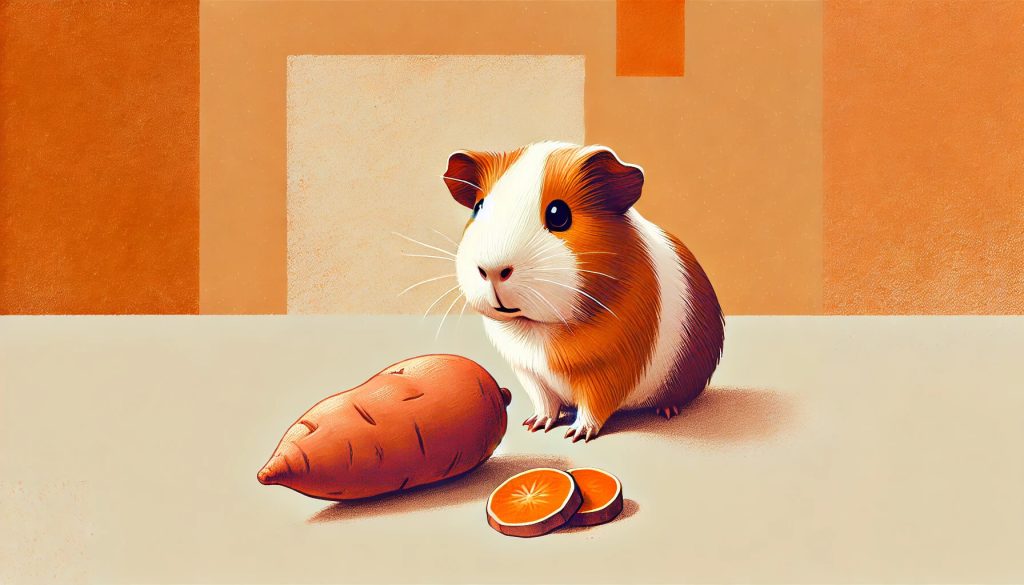
Can Guinea Pigs Eat Sweet Potatoes?
Nutritional Benefits of Sweet Potatoes for Guinea Pigs
Sweet potatoes offer several nutritional benefits for guinea pigs, making them a valuable addition to their diet in moderation.
Vitamin Content
Sweet potatoes are rich in vitamins that are crucial for your guinea pig’s health. They contain high levels of Vitamin A, essential for vision and immune function. The beta-carotene in sweet potatoes converts to Vitamin A in the body. Vitamin C, another vital nutrient for guinea pigs, helps prevent scurvy, a common issue in these pets. Since guinea pigs can’t synthesize Vitamin C, including sweet potatoes in their diet can help meet their needs. B vitamins in sweet potatoes also support energy metabolism and overall vitality.
Fiber and Antioxidant Levels
The high fiber content in sweet potatoes aids in digestion and promotes healthy gut function. Guinea pigs need continuous access to fibrous foods to keep their digestive systems working properly. Antioxidants in sweet potatoes, like beta-carotene and Vitamin E, help reduce oxidative stress and promote cellular health. The presence of these antioxidants can support your guinea pig’s immune system and contribute to a longer, healthier life.
Potential Health Issues
Feeding sweet potatoes to guinea pigs can pose potential health issues if not done correctly. Careful consideration of quantity and frequency is essential.
Sugar Content and Diabetes Risk
Sweet potatoes contain significant sugar. High sugar intake in guinea pigs can lead to diabetes. Guinea pigs’ digestive systems aren’t built to process large amounts of sugar. Limiting sweet potato portions helps avoid this risk. Fresh sweet potato servings should be small, infrequent treats rather than daily staples.
The Danger of Overfeeding
Overfeeding sweet potatoes can disrupt guinea pigs’ nutrition balance. Excessive carbohydrate intake causes weight gain and obesity. Obesity in guinea pigs leads to various health problems like heart disease and joint issues. Sweet potatoes should complement their diet, not dominate it. A small slice, once or twice a week, suffices.
Feeding Guidelines
When incorporating sweet potatoes into your guinea pig’s diet, follow precise guidelines to ensure their health and well-being.
How to Introduce Sweet Potatoes to Guinea Pigs
Start by washing the sweet potato thoroughly to remove any pesticides or contaminants. Next, peel the skin off to decrease the risk of choking hazards. Cut the potato into very small, manageable pieces. Offer a tiny piece initially, around the size of a pea, to observe any adverse reactions. Monitor your guinea pig for signs of digestive upset, such as diarrhea or bloating. If no issues arise, you can gradually offer the sweet potato as an occasional treat. Limit introduction to once a week to avoid overwhelming their system.
Appropriate Serving Sizes
Control portion sizes to prevent overconsumption of sugar. An appropriate serving size is a small cube, roughly one cubic centimeter, offered no more than twice per week. Frequent servings can lead to obesity and other health concerns. Sweet potatoes should not replace the primary diet of hay, fresh vegetables, and fortified pellets. As treats, they contribute to variety without compromising nutritional balance. Always ensure fresh water is available to aid digestion after consuming sweet potatoes.
Alternative Safe Foods for Guinea Pigs
Guinea pigs thrive on a variety of fresh vegetables and fruits. These options can help maintain a balanced diet and supplement their hay and pellet intake.
Fresh Vegetables
- Carrots: Provide a good source of beta-carotene. Offer small pieces occasionally due to sugar content.
- Bell Peppers: High in vitamin C. Include different colors for variety.
- Kale: Rich in calcium and vitamin K. Feed in moderation to avoid excess calcium.
- Cucumbers: Hydrate guinea pigs without adding calories. Remove seeds to prevent digestive issues.
- Zucchini: Low-calorie option, beneficial for weight management. Offer thin slices.
Fresh Fruits
- Apples: High in fiber and vitamin C. Remove seeds and stem to prevent toxicity.
- Blueberries: Packed with antioxidants. Offer sparingly due to sugar content.
- Strawberries: Contain vitamin C. Limit to occasional treats.
- Oranges: Excellent vitamin C source. Provide in small wedges, removing any seeds.
Leafy Greens
- Romaine Lettuce: Hydration without many calories. Avoid iceberg lettuce due to low nutritional value.
- Spinach: High in vitamins A, C, and K. Feed occasionally due to oxalate content.
- Cilantro: Freshens breath and adds variety. Suitable for regular feeding.
- Parsley: Rich in antioxidants. Offer in small amounts to prevent digestive upset.
- Basil: Adds variety to their diet. Use as an occasional treat.
- Mint: Aids digestion. Provide fresh sprigs as a special treat.
Ensure these foods are washed thoroughly before serving to remove pesticides. Always introduce new foods gradually. Monitor for any signs of digestive distress and consult a vet if necessary. Use these options to create a varied and balanced diet, enhancing your guinea pig’s overall health and wellbeing.
Conclusion
Feeding sweet potatoes to your guinea pigs can be a treat, but it’s essential to do so in moderation. Always prepare and serve them safely to avoid any health issues. Don’t forget to explore other safe food options like fresh vegetables, fruits, and leafy greens to keep their diet balanced and varied. Washing foods thoroughly and introducing them gradually will help you monitor for any digestive distress. By paying attention to these details, you’ll ensure your guinea pigs stay healthy and happy.
